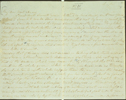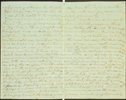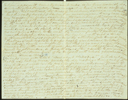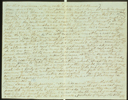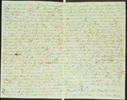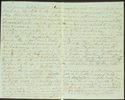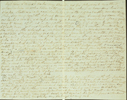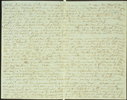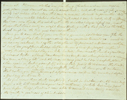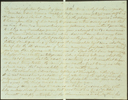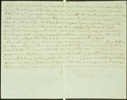Mahatma Letter No. 8: Difference between revisions
No edit summary |
No edit summary |
||
| Line 124: | Line 124: | ||
<br> | <br> | ||
<br> | <br> | ||
of your personal interest in [[occultism]] and [[theosophy]]? I do not say it was, I but enquire whether the contingency ever presented itself to your mind." Now of course this was addressed to [[A. P. Sinnett|Sinnett]], but still I wish to answer it in my fashion. First I should say, <u>cui bono</u> throwing out such a hint? You must know whether it was so or not. If it was not, why set us speculating as to whether it <u>may</u> have been, when you know it was <u>not</u>. But if it was so, then I submit, that in the first place an idiotic business like this could be no test of any <u>man's</u> (there are of course lots of human beings who are only a sort of educated monkey) personal interest in anything. '''Would any <u>man</u>, who felt ever the slightest interest in anything, suffer this interest to be affected by the fact that some other person made themselves ridiculous in connexion there with?''' In the second place if the [[Brothers]] did deliberately allow the publication of those letters, I can only say, that from my worldly non-initiated standpoint, I think they made a sad mistake. '''A cause may involve murder & robbery and yet not be wholly discredited but make it ridiculous & you may write its epitaph. Mind I do not for one moment defend this. It is monstrous that it should be so - but it is unfortunately a fact,''' and the object of the [[Brothers]] being avowedly to make the [[Theosophical Society|T.S.]] respected, they could hardly have selected any worse means, than the publication of these foolish letters. '''I do not of course attach any very great importance to them - if there be a real vital breath underlying the T. S. (& it is this I am truly trying to arrive at), it will outlive & smother a hundred such <u> | of your personal interest in [[occultism]] and [[theosophy]]? I do not say it was, I but enquire whether the contingency ever presented itself to your mind." Now of course this was addressed to [[A. P. Sinnett|Sinnett]], but still I wish to answer it in my fashion. First I should say, <u>cui bono</u> throwing out such a hint? You must know whether it was so or not. If it was not, why set us speculating as to whether it <u>may</u> have been, when you know it was <u>not</u>. But if it was so, then I submit, that in the first place an idiotic business like this could be no test of any <u>man's</u> (there are of course lots of human beings who are only a sort of educated monkey) personal interest in anything. '''Would any <u>man</u>, who felt ever the slightest interest in anything, suffer this interest to be affected by the fact that some other person made themselves ridiculous in connexion there with?''' In the second place if the [[Brothers]] did deliberately allow the publication of those letters, I can only say, that from my worldly non-initiated standpoint, I think they made a sad mistake. '''A cause may involve murder & robbery and yet not be wholly discredited but make it ridiculous & you may write its epitaph. Mind I do not for one moment defend this. It is monstrous that it should be so - but it is unfortunately a fact,''' and the object of the [[Brothers]] being avowedly to make the [[Theosophical Society|T.S.]] respected, they could hardly have selected any worse means, than the publication of these foolish letters. '''I do not of course attach any very great importance to them - if there be a real vital breath underlying the T. S. (& it is this I am truly trying to arrive at), it will outlive & smother a hundred such <u>brows</u> - magna est veritas et prevalebit -''' but still when the question is broadly put, did you ever consider whether the [[Brothers]] allowed this publication, I cannot avoid replying, if they did not, it is futile wasting consideration on the matter, and if they did, it seems to me that they were unwise in so doing. (4) | ||
Then come your remarks about [[H. S. Olcott|Colonel Olcott]]. Dear old [[H. S. Olcott|Olcott]], whom everyone who knows must love. I fully sympathize in all you say | Then come your remarks about [[H. S. Olcott|Colonel Olcott]]. Dear old [[H. S. Olcott|Olcott]], whom everyone who knows must love. I fully sympathize in all you say | ||
Revision as of 08:01, 1 January 2014
| Quick Facts | |
|---|---|
| People involved | |
| Written by: | A. O. Hume |
| Received by: | Koot Hoomi/A. P. Sinnett |
| Sent via: | A. P. Sinnett/H. P. Blavatsky |
| Dates | |
| Written on: | November 20, 1880 See below. |
| Received on: | December 1, 1880 See below. |
| Other dates: | none |
| Places | |
| Sent from: | Simla, India |
| Received at: | Allahabad, India, by A. P. Sinnett |
| Via: | none |
This is Letter No. 99 in Barker numbering. See below for Context and background.
< Prev letter chrono
Next letter chrono >
< Prev letter Barker
Next letter Barker >
Page 1 transcription, image, and notes
|
NOTE - Ellipsis in printed text has been added back from letter image, printed in boldface.
My Dear Koot Humi, I have sent Sinnett your letter to me and he has kindly sent me yours to him. I want to make some remarks on this, not by way of cavil, but because I am so anxious that you should understand me. Very likely it is my conceit, but whether or no I have a deep rooted conviction that I could work effectually if I only saw my way, and I cannot bear the idea of your throwing me over under any misconception of my views. And yet every letter I see of yours, shows me that you do not yet realize what I think and feel.* To explain this I venture to jot down a few comments on your letter to Sinnett. You say that if Russia does not succeed in taking Tibet, it will be due to you and herein at least you will deserve our gratitude — I do not agree to this in the sense in which you mean it. (1) If I thought that Russia would on the whole govern Tibet or India in such wise as to make the inhabitants on the whole happier than they are under the existing Gov[ernmen]ts, I would myself welcome and work for her advent. But so far as I can judge the Russian Gov[ernmen]t is a corrupt despotism, hostile to individual liberty of action and therefore to real progress. And it would only be in common with all well wishers of mankind & not as an Englishman (& indeed I have no nationality) that I should feel gratitude to you or anyone else who by legitimate means (& what are under different |
NOTES: |
Page 2
|
NOTE - Ellipses in printed text have been added back from letter image, printed in boldface.
|
NOTES: |
Page 3
|
NOTE - Ellipsis in printed text has been added back from letter image, printed in boldface.
Perhaps you will retort "how about Slade's case?" but do not forget that he was taking money for what he did; making a living out of it. Very different would be the position of a man, who came forward to teach gratuitously, manifestly at the sacrifice of his own time, comfort and convenience, what he believed it to be for the good of mankind to know. At first no doubt everyone would say the man was mad or an impostor — but then when phenomenon on phenomenon was repeated and repeated, they would have to admit there was something in it, and within three years, you would have all the foremost minds in any civilized country intent upon the question and tens of thousands of anxious enquirers out of whom ten per cent. might prove useful workers, and one in a thousand perhaps develop the necessary qualifications for becoming ultimately an adept. If you desire to react on the native through the European mind that is the way to work it. Of course, I speak under correction and in ignorance of conditions, possibilities, etc., but |
NOTES:
|
Page 4
|
NOTE - Long ellipsis in printed text has been added back from letter image, printed in boldface.
Then I come to the passage, "Has it occurred to you that the two Bombay publications if not influenced may at least have not been prevented by those who might have done so because they saw the necessity for that much agitation to effect the double result of making a needed diversion after the brooch grenade, & perhaps of trying the strength |
NOTES:
|
Page 5
|
NOTE - Ellipsis in printed text has been added back from letter image, printed in boldface.
Then come your remarks about Colonel Olcott. Dear old Olcott, whom everyone who knows must love. I fully sympathize in all you say |
|
NOTES:
|
Page 6
|
NOTE - Ellipsis in printed text has been added back from letter image, printed in boldface.
|
NOTES: |
Page 7
|
NOTE - Ellipsis in printed text has been added back from letter image, printed in boldface.
To return to Olcott — I do not think his connection with the proposed Society would be any evil. Sinnett thinks this I believe - I do not - given any real vital principle as a basis to the Society & nobody's connections with it could do any very permanent harm - So I quite agree in all you say about this. But when you go on to say "But if you now so dislike the idea of a purely nominal executive supervision by Col Olcott - an American of your own race - you would surely rebel against dictation from a Hindoo" you must entirely mistake my feelings at any rate. |
NOTES:
|
Page 8
|
NOTE - Ellipsis in printed text has been added back from letter image, printed in boldface.
|
NOTES:
|
Page 9
|
NOTE - Entire page was omitted from printed editions, and text has been added back from letter image, indicated in boldface.
|
NOTES:
|
Page 10
|
NOTE - Entire page was omitted from printed editions, and text has been added back from letter image, indicated in boldface.
On the other hand, I do not care to play at Theosophy. Either I go in for it in real earnest or not at all. If my stricture of the right of private judgment renders the real earnest impossible under your rules - well and good - the thing must be at an end for me. It seems to me useless to discuss articles of association and the like unless these fundamental questions are first settled. Sinnett is deeply interested in the phenomena as such. I am not. He thinks |
NOTES: |
Page 11
|
NOTE - Long ellipsis in printed text has been added back from letter image, printed in boldface.
Yours sincerely, |
NOTES: |
Context and background
Letter No. 8 (ML-99) and No. 9 (ML-98) have to be considered together. Letter No. 8 is dated November 20, 1880, but it was not transmitted to the Mahatma until Dec. 1, 1880 or later. Letter No. 9 was received on Dec. 1, 1880 or shortly thereafter, on the same date that Letter No. 8 was transmitted to K.H. Letter No. 8 is from Hume to the Mahatma; Letter No. 9 is a reply to that letter, but is directed to Sinnett rather than to Hume.
This may seem confusing. In The Occult World, p. 122, Sinnett mentions that Hume wrote a long reply to the Mahatma’s first letter to him, and subsequently an additional letter to K.H. which he forwarded to Sinnett, asking him to read it and then seal it up and send or give it to H.P.B. for transmittal, since she was expected soon at Allahabad. Letter No. 8 is this additional letter.[1]
A footnote in the first three editions reads, "Extracts only are given from this letter." We are offering here the complete transcription for the first time.
Physical description of letter
The original is in the British Library, Folio 3. According to George Linton and Virginia Hanson,
ML-99 is a letter from AOH to KH, forwarded to APS by KH with his comments thereon (ML-98). AOH's letter is in black ink on folded paper.[2]
Publication history
Commentary about this letter
Notes
- ↑ George E. Linton and Virginia Hanson, eds., Readers Guide to The Mahatma Letters to A. P. Sinnett (Adyar, Chennai, India: Theosophical Publishing House, 1972), 43.
- ↑ George E. Linton and Virginia Hanson, eds., Readers Guide to The Mahatma Letters to A. P. Sinnett (Adyar, Chennai, India: Theosophical Publishing House, 1972), 47.
